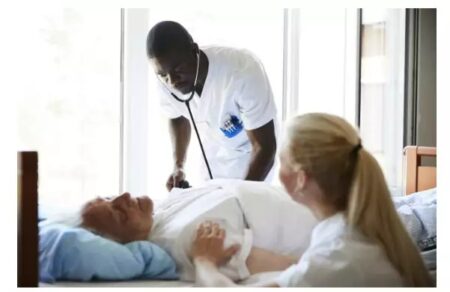Elderly people increase in joint pain During Winter Season
Dr Vishwajeet Chavan, Orthopedic Surgeon, Apollo Spectra Pune Pune :- Winter not only leads to respiratory or skin problems but even joint pain in the elderly population. It will be imperative for elderly people to stay

Dr Vishwajeet Chavan, Orthopedic Surgeon, Apollo Spectra Pune
Pune :- Winter not only leads to respiratory or skin problems but even joint pain in the elderly population. It will be imperative for elderly people to stay healthy during winter. Stay warm, exercise every day, and maintain an optimum weight, use a heating pad over aching joints can help people to manage joint pain.
Winter is often considered pleasing but it can invite a variety of health issues. Winter season is commonly linked to joint pain. One’s knees, hips, ankles, hands, and legs can pain during colder days. “During winter, there is a limited amount of sunlight and less blood supply to the parts of the body because of which one’s joint becomes stiff and starts paining. Moreover, a drop in barometric pressure can cause the tendons, muscles, and surrounding tissues to expand and pain. The cold weather makes muscles feel tensed up and tight and one can experience achy joints. Joint Pain is commonly seen in adults aged 60 to 85. There can be a lot of discomfort and immobility.”
Expert Doctor Said, Half of the consultations we see are of joint pains especially in elderly patients and it increased by 50 per cent as the monsoon begins. There is no one explanation for why dropping temperatures affect your joints. One theory relates to drops in barometric pressure, which causes tendons, muscles, and the surrounding tissues to expand. Because of the confined space within the body, this can cause pain, especially in joints affected by arthritis. Everyone’s body reacts to fluctuating barometric pressure, but people with arthritis and those with chronic pain are more vulnerable to feeling discomfort.
Winter is synonymous with joint pain. Vitamin D levels fall in winter owing to less sun exposure causing weakened joints. Joint Pain is commonly seen in adults aged 60 to 85. Those senior citizens already diagnosed with arthritis should be more cautious during the colder months. A vitamin D test helps to know about the vitamin D levels in the body. A Vitamin D3 test will be suggested if you have joint pain.
It is imperative to prevent joint pain in winter. So, eat a nutritious diet consisting of vegetables, cereals, dairy products, pulses, and seasonal fruits. Don’t forget to opt for spinach, cabbage, tomatoes, and oranges which are loaded with essential vitamins and minerals. Stretching and exercises done with light weights can help to combat joint pain. Try to do other activities such as cycling, walking, aerobics, and swimming too in order to improve flexibility and manage joint pain. Maintain proper posture, stay warm by dressing up in layers, take a warm shower, avoid lifting heavy things, use heating pads to tackle joint pain, and cut down those excess kilos. Stay hydrated by drinking enough water that will help in joint lubrication, and take medication prescribed by the doctor only.
When to see a doctor?
If the pain worsens you must seek medical help as there can be several other possible reasons behind this pain. You should not rely on home remedies for too long. Dr. Chavan also explains that an individual should choose medical help immediately if-
• There is visible swelling in the joint especially asymmetric
• Progressive increase in pain inspires of preventive measures mentioned earlier
• Restricted range of joint movements
• Significant limp while walking
• Any raised temperature or redness over the joint
• Associated fever






